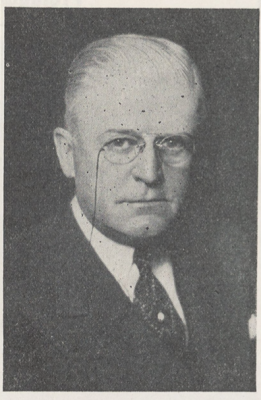Frank J. Hogan (1877 - 1944) graduated from Georgetown University School of Law in 1902 with an LL. B. degree. He worked at the firm of Sheehy & Hogan in Washington, DC.
Hogan was born on January 12, 1877 in Brooklyn, New York to Maurice Hogan and Mary Sweeny and was of Irish decent. He was educated in Charleston, South Carolina before coming to Georgetown. While studying at the law school from 1899 - 1902 he also served as private secretary to the quarter master general of the United States Army, Marshal I. Ludington. Hogan was a member of of the Century Club of Washington, the National Geographical Society, and the Knights of Columbus. He married Mary Cecile Adair with whom he had one daughter, Dorothy Hogan.1
Hogan entered the Law School in 1900 and attended night classes for two and half years before graduating with the highest honors. He worked at the War Department during the day. From 1908 to 1918 he was on the faculty of the Law School, teaching Evidence, Wills, and Partnership. In 1925 he received and honorary Doctor of Laws degree from Georgetown. He was the president of the District of Columbia Bar Association from 1932 - 1933, and was was elected president of the American Bar Association in 1938.2 That year an article in The Hoya said he was "generally considered the greatest trial lawyer in the country."3
On December 11, 1938, Hogan gave a nationally broadcast radio address denouncing anti-Semitism and intolerance in general. He argued that "...we Catholics cannot permit men of ill will to preach in American bigotry and anti-Semitism without raising our voices in protest."4
Hogan was the president of the Georgetown University Alumni Association from 1919 to 1940.5 Prior to 1938, the Alumni Association was only sporadically organized and thus did not hold regular elections, resulting in Hogan's long tenure as president. He presided over the 1940 meeting in which the Association drafted its constitution and elected the first president of the modern association, Martin F. Conboy (1898).6
He died in Washington, DC on May 15, 1944 after a long illness.7
- 1"Hogan, Frank J., LL.B.," Easby-Smith, James S. (James Stanislaus). Georgetown University In the District of Columbia, 1789-1907: Its Founders, Benefactors, Officers, Instructors And Alumni. New York: The Lewis Publishing Company, 1907, Vol. 2 pp. 321 - 322. https://hdl.handle.net/2027/nyp.33433076015860?urlappend=%3Bseq=338
- 2"Frank J. Hogan, Georgetown Grad, Made President of Bar Association," The Hoya, October 5, 1938, Vol. XX No. 1, p.3. http://hdl.handle.net/10822/1047642
- 3"Frank J. Hogan, Georgetown Grad, Made President of Bar Association," The Hoya, October 5, 1938, Vol. XX No. 1, p.12. http://hdl.handle.net/10822/1047642
- 4"Text of Address by Frank J. Hogan," The Pittsburgh Post-Gazette, December 12, 1938, p. 32. https://news.google.com/newspapers?id=coUbAAAAIBAJ&sjid=NU4EAAAAIBAJ&pg=1645%2C5080353
- 5"Past Presidents and Executive Directors," https://alumni.georgetown.edu/alumni-association/past-presidents
- 6John J. Tunmore, "The Alumni Association...Its History," Georgetown University Alumni Association Magazine, March 1954, Vol. 6, No. 6, p. 5. http://hdl.handle.net/10822/709108
- 7"Frank J. Hogan - 1877-1944." American Bar Association Journal, vol. 30, no. 7, July 1944, p. 393-395. HeinOnline, https://heinonline-org.proxy.library.georgetown.edu/HOL/P?h=hein.journals/abaj30&i=445.


